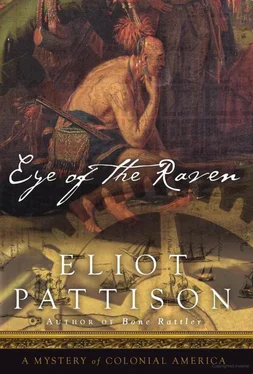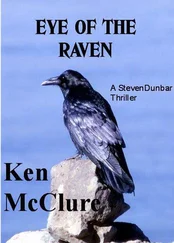Eliot Pattison - Eye of the Raven
Здесь есть возможность читать онлайн «Eliot Pattison - Eye of the Raven» весь текст электронной книги совершенно бесплатно (целиком полную версию без сокращений). В некоторых случаях можно слушать аудио, скачать через торрент в формате fb2 и присутствует краткое содержание. Год выпуска: 2010, ISBN: 2010, Издательство: Counterpoint Press, Жанр: Исторический детектив, на английском языке. Описание произведения, (предисловие) а так же отзывы посетителей доступны на портале библиотеки ЛибКат.
- Название:Eye of the Raven
- Автор:
- Издательство:Counterpoint Press
- Жанр:
- Год:2010
- ISBN:9781582437019
- Рейтинг книги:5 / 5. Голосов: 1
-
Избранное:Добавить в избранное
- Отзывы:
-
Ваша оценка:
- 100
- 1
- 2
- 3
- 4
- 5
Eye of the Raven: краткое содержание, описание и аннотация
Предлагаем к чтению аннотацию, описание, краткое содержание или предисловие (зависит от того, что написал сам автор книги «Eye of the Raven»). Если вы не нашли необходимую информацию о книге — напишите в комментариях, мы постараемся отыскать её.
Eye of the Raven — читать онлайн бесплатно полную книгу (весь текст) целиком
Ниже представлен текст книги, разбитый по страницам. Система сохранения места последней прочитанной страницы, позволяет с удобством читать онлайн бесплатно книгу «Eye of the Raven», без необходимости каждый раз заново искать на чём Вы остановились. Поставьте закладку, и сможете в любой момент перейти на страницу, на которой закончили чтение.
Интервал:
Закладка:
Ancient hands had also worked the walls of the cave, some with chisels like on the ledge above, some with pigments. Most of the images had been recently scraped away with a blade, some covered with bear grease, but he could see features here and there of hunters with spears, of huge oxlike creatures with short horns, of moose and bears three times the height of the human figures. As he stepped inside, an unmistakable odor rose from the rear of the cave. Someone had defecated against the back wall.
"She weeps," Conawago said behind him. He pulled a heavy branch back to let more light into the cave. "She weeps," he repeated.
The pain on his friend's face was so deep Duncan expected to see tears there too. But Conawago's grief was tempered by an intense fascination, an awe he could not hide. Gazing reverently, his eyes came to rest upon the most intact of the little images. It was a human figure facing one of the ruined bears, holding out not a spear but what looked like the skull of another animal. "This," he said, "is who we were."
He walked slowly along the walls, pausing at each image. "For generations, she says, since long before the formation of the confederation, people of her clan have come here, left offerings, sat under the full moon and performed their chants. Even in the middle of a war the enemies could come here and be as one."
Duncan could hear the excitement in Conawago's tone. Their journeys during the past months had been in search of such places of power. "This is who we were," Conawago repeated as he gazed again at the image of the man reaching out to the bear, then gestured toward the feces on the wall that had ruined another painting. "This is who we become."
"Surely it was Europeans who did this."
"Stone Blossom knows who did it. Shamokin Indians, town Indians. Some Iroquois, some town Delawares out on a trapping expedition. They had little success and were on their way home. An English trader going up the river found them camped here and bartered a keg of rum for the few skins they had taken. They spent the day getting drunk here. One of the Indians had been instructed by missionaries and told the others their bad luck came from these graven images. They spent hours drinking and destroying. At some point one remembered they could sell the old images to collectors in Philadelphia, so they tried to pull some up. There used to be a shrine of old human skulls, holy men of the tribes, some from many generations ago. They threw them all in the river."
"When Skanawati found out he beat several of them within an inch of their lives. He told his mother it was a sign, that the village had to move into the endless mountains, to the other place he had found, to protect it and keep it secret."
"You mean his hidden valley?"
"It has another shrine, she says, below a high ledge with similar carvings, where a raven makes its nest."
"They should have moved then."
"It takes much preparation. They had to wait until warm weather, gather syrup from the spring maples, make the new grave." Conawago rubbed at one of the grease-stained images, saw that the grease was carrying away the pigment, and gave up.
They found Stone Blossom on her knees, gazing again at the shattered images. She stood as they returned, gesturing them closer, then taking a hand from each of them in her own. "You have been purified in the heat of our lodge," she said. "You have each spoken to our dead. You have come to this same place from different paths." The matriarch looked at them expectantly.
"What is it you wish, Grandmother?" Conawago asked.
"You must help us through this. Together," she said pointedly, steadily regarding him. She had seen Conawago's despair. "I dreamt of two outsiders coming to help our village. I could never see their faces, until now."
Conawago went very still, closing his eyes for a moment before glancing at Duncan. "We are here," he whispered.
"Every guide we have sent to find our path has failed," she said. "But the two of you know things together you do not know apart." The old woman nodded at them solemnly, then released their hands and bent to lift bundles of rushes she had gathered from the river's edge. Duncan and Conawago each took one, and they knelt with Stone Blossom to clean away the debris from the little gods.
Only when they had finished did Duncan speak. "Why," he asked Conawago, "during such an important time for the village and his clan would Skanawati go to Philadelphia?" The new chief would have just taken over from his predecessor and had already told his people they had to move their village.
Conawago repeated Duncan's question to the woman in her tongue, triggering a low, hurried conversation. "Last year," his friend finally explained, "she says there was an Englishman who had been trapping, who stopped in Shamokin. He came in from the endless mountains. Skanawati spoke with him, at Rideaux's place. The man had told Rideaux he had seen the old shrine on the ledge. Skanawati's shrine."
Duncan looked up with new despair. "Surely he did not try to destroy that one as well?"
"Not at all. He said merely the mountains had no good fur left."
"But that does not explain. . " Duncan started, but the woman was done, turning back to the canoe.
"Moses told me the rest last night," Conawago said, pain rising in his voice now. "That Englishman was Francis Townsend, the surveyor killed months later on the Warriors Path. Skanawati learned from Rideaux that he had not just been trapping. Townsend was educated, knew how to look for minerals. He had drawn a detailed map with the plan of selling it in Philadelphia. He had been at the shrine, had drawn it on his map. And he had marked that its valley was rich in minerals and Indian artifacts."
"So Townsend went back to Philadelphia to sell his map?"
"A piece of paper like that could be worth more than a wagon of pelts. Skanawati left for Philadelphia an hour after learning of the map, even though he had never been there, had no idea how to find this man. When his brother learned that Skanawati had gone to Philadelphia he too left, a day behind. Skanawati returned a month later, alone. He said nothing of what happened until just before he left the village three weeks ago. He said then to his mother, pray for the spirit of his brother, her second son, for he had died a warrior's death in the city of the Quakers."
Duncan considered the words. "Why would his brother have followed him to Philadelphia?"
"His brother had been earning money to buy seed corn for the village."
"What are you saying?"
"He did not understand the scratchings Townsend made on his papers. He did not know about Skanawati's plans for the new village until he returned. But he had been the guide for Townsend when he drew the map."
CHAPTER ELEVEN
Socrates moon was the name Conawago assumed in the European world, the swarthy exotic traveler who had crossed the Atlantic several times, looking and speaking the part of the educated gentleman when need be. Duncan watched with a weary grin as his friend completed the transformation by donning a crumpled waistcoat he kept rolled in his pack over his linen shirt, covering the long trail of hair gathered at his back.
"You will put me to shame in the taverns," Duncan chided.
"No. Because you are staying here," the Indian said, with a gesture toward the little clearing they had found in the forest overlooking the city. It was an argument that had risen with increasing frequency during their days of hurried travel from Shamokin. "Lord Ramsey is somewhere on those streets," Conawago reminded him again. "He will have you in chains a moment after he spies you. And once he has you, Duncan, you will be lost forever." The old Nipmuc had once told Duncan that Ramsey was a manifestation of the malevolent spirits that dwelled in certain corners of the wilderness, waiting to commit mayhem.
Читать дальшеИнтервал:
Закладка:
Похожие книги на «Eye of the Raven»
Представляем Вашему вниманию похожие книги на «Eye of the Raven» списком для выбора. Мы отобрали схожую по названию и смыслу литературу в надежде предоставить читателям больше вариантов отыскать новые, интересные, ещё непрочитанные произведения.
Обсуждение, отзывы о книге «Eye of the Raven» и просто собственные мнения читателей. Оставьте ваши комментарии, напишите, что Вы думаете о произведении, его смысле или главных героях. Укажите что конкретно понравилось, а что нет, и почему Вы так считаете.












